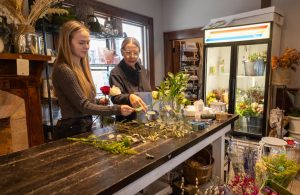OPINION: Freshmen don’t need cars on campus
October 12, 2022
On campus students are all allowed to have cars on campus to facilitate their living experience. Students living off campus also have cars to make it on campus for class. However, finding a parking spot on campus can be a hard process many can have trouble navigating.
Currently, App State has nine parking lots for students to utilize. There are two off campus lots, Appalachian 105 Lot and State Farm. Three of the remaining seven, Mountaineer, Mountain Laurel and Appalachian Heights, are restricted to residents of their respective residence halls. Four lots are left for students to park in if they want to be somewhat close enough to campus to walk.
Freshmen are only allowed to park in the Appalachian 105 Lot, but other classes are also allowed to buy a parking pass there. Because of the lack of parking available near campus for all the upperclassmen, Appalachian 105 ends up housing many sophomore cars. Appalachian 105 is also about 1.5 miles away from campus and is not walkable from campus. Students have to take AppalCart or catch a ride to get to and from the lot.
The competition for freshmen to snag a spot in Appalachian 105 is not worth the trouble and they are better off not bringing a car anyway. Of course, there are freshmen coming from the other side of the state as well as all over the country and a car is necessary for them to go to and from their homes on weekends and breaks if their families are unable to give them a ride. There will always be freshmen living in situations where a car is a necessary part of their college experience. However, if a freshman is in a place where they can live without a car on campus, they definitely should.
Not to mention, parking on or around campus is a hefty addition to the already extensive list of expenses for college students. Buying a parking pass on campus will cost $300-$600 per year. If a student doesn’t manage to get a parking spot on a university affiliated lot, off campus parking lots are charging anywhere between $300-$900, some per semester and some per year. Not bringing a car to Boone for at least one’s freshman year could save some money.
The university is accepting more students on campus every year. Last fall, the university accepted its largest freshman class of 4,099 students. Boone is continuing to grow into a bustling town with students and Boone locals struggling to find off campus housing and parking spots alike.
Boone’s population has increased consistently over the past decade, with and without university students. Boone’s increase in population and lack of fitting infrastructure has caused unbearable traffic on Blowing Rock Road. Everyone should do their part to help decrease congestion on Boone roads, especially for the people who absolutely need cars to get around Boone. Freshmen who are able to do their part and leave their cars behind should do so.
A big part of the college experience across the U.S. is living on campus and walking everywhere. The idea of walkable campuses and communities is supported by the Office of the Surgeon General. Walkable communities promote both physical and mental health which is especially important for college students.
Living on a walkable campus can improve happiness and sense of belonging to a community. The recent freshmen class is coming onto campus after a high school experience riddled with COVID-19 restrictions. Living on a walkable campus can enhance their sense of belonging in their new university community and simultaneously promote physical activity.
Freshman year is the year to enjoy a college campus to the fullest because living on campus for the remainder of undergraduate studies is not always guaranteed. Rolling out of bed and heading out of a residence hall to lay on Sanford Mall will never be as easy as it is freshman year. The university’s campus has everything a freshman can need on campus: food, coffee, markets, a post office, residence halls equipped with several amenities, gyms and countless places to study and hangout.
However, if there is anything a freshman can’t find on campus, the AppalCart is readily available to get students from point A to point B. A popular AppalCart destination is Walmart, where freshmen can grab anything they can’t find in campus markets.
If hopping on a bus seems like a hassle, freshmen could always walk off campus and onto King Street. King Street houses several restaurants, coffee shops, boutiques, an antique store and even a bookstore. A King Street outing with friends can be a core memory for many university students.
Freshmen should take advantage of living on campus and exploring the university on foot. Walkable communities are hard to come by in the U.S., so living on a college campus might be their only chance to live in a walkable community in their lifetime. In fact, many campuses in the U.S. actually prohibit freshmen from having cars on campus. Of course, the university’s rural location and students with extenuating circumstances stops them from prohibiting freshmen cars, but freshmen can and should make that decision to leave their cars behind on their own.













MuChao • Oct 17, 2022 at 8:42 am
Now take all the troubles of trying to find a place to park and imagine being an employee of the university where you’re forced to pay for a parking pas just so you can go to work. You read that right, employees must PAY to park at the very place where we work, and no guaranteed place to park either, unless of course you’re Sheri, who gets her own special spot.
Additionally, we don’t have the benefit of being able to live on campus. Heck, most of us can’t even afford to live in town (or even the county!) and have to travel 25-45 minutes or more every day to work, because Boone/Watauga is so cost-prohibitive for working folks and because AppState pays staff such criminally low salaries (unless of course you’re an admin or a coach…)
Mark • Jun 16, 2023 at 4:46 am
Find another job. Paying for parking at work is not uncommon so don’t act like it is.